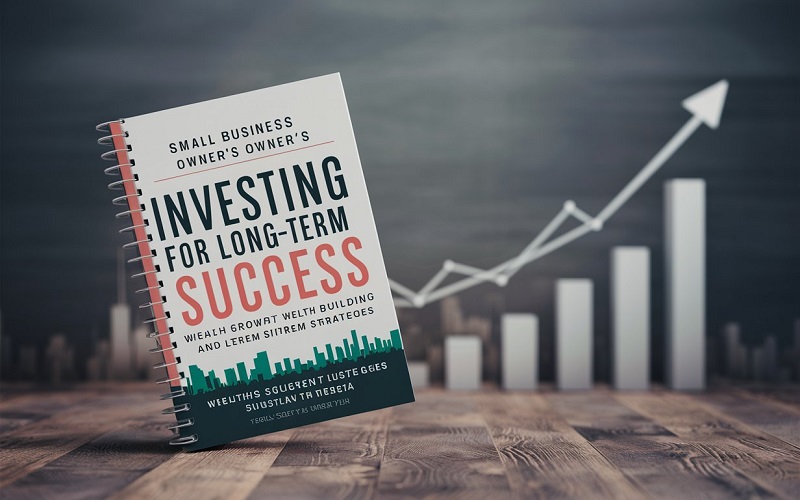
Small Business, Big Future: Securing Your Retirement with Strategic Retirement Planning
December 1, 2023
Unlocking Your Potential: Matching the Right Small Business Financing Option to Your Needs
December 13, 2023Different Investment Options for Small Business Owners: A Comprehensive Guide
Introduction
As a small business owner, you have a unique set of financial challenges and opportunities. Unlike a traditional employee, your income and cash flow can be more unpredictable, and you wear many hats, making it difficult to find time for financial planning. However, investing is crucial for small business owners to secure their financial future, grow their businesses, and achieve their long-term goals.
This article provides a comprehensive guide on the various investment options available to small business owners, helping you understand the risks and rewards of each and make informed decisions about where to allocate your capital.
Understanding Your Risk Tolerance and Investment Goals
Before diving into specific investment options, it’s essential to assess your risk tolerance and clearly define your investment goals. Your risk tolerance refers to your comfort level with potential losses, while your investment goals outline what you hope to achieve with your investments.
Considering your risk tolerance:
- High risk tolerance: If you’re comfortable with potential losses in exchange for higher potential returns, you may be suited for investments like stocks or real estate.
- Moderate risk tolerance: If you prefer a balance between risk and reward, you may find mutual funds, ETFs, or balanced investment portfolios appealing.
- Low risk tolerance: If you prioritize capital preservation and minimize potential losses, bonds or money market accounts might be more suitable for you.
Defining your investment goals:
- Short-term goals: Are you saving for a specific expense within the next few years, such as a new equipment purchase or business expansion?
- Long-term goals: Are you investing for your retirement, your children’s education, or to build wealth and financial security over the long term?
Exploring the Different Investment Options Available
Small business owners have access to a wide range of investment options, each with its own unique characteristics and potential benefits. Here’s a brief overview of some of the most popular options:
Traditional Investment Options:
- Stocks: Represent ownership in a company and offer the potential for high returns through capital appreciation and dividends. However, they also come with greater volatility and risk.
- Bonds: Loan money to the government or corporations, offering a steady stream of income through fixed interest payments. Bonds are generally considered less risky than stocks but also offer lower potential returns.
- Mutual Funds and ETFs: Invest in a basket of securities, providing diversification and professional management. Mutual funds are actively managed by investment professionals, while ETFs track a specific index.
Alternative Investment Options:
- Real Estate: Offers the potential for rental income, property appreciation, and tax benefits. However, it requires significant capital investment and ongoing management.
- Peer-to-Peer Lending: Provides an opportunity to earn higher interest rates by lending money directly to individuals or businesses. However, there is a risk of borrowers defaulting on their loans.
- Crowdfunding: Enables small businesses to raise capital from a large number of investors through online platforms. This can be a valuable source of funding for startups and small businesses but also carries risks associated with business failure.

Choosing the Right Investment Options for You
With so many options available, it can be challenging to choose the right investment strategy. The best approach involves carefully considering your financial situation, including your cash flow, investment horizon, and financial goals. It’s also recommended to seek professional guidance from a financial advisor who can assess your individual needs and develop a personalized investment plan.
Traditional Investment Options
A. Stocks:
- Types of stocks: Common stocks, preferred stocks, growth stocks, dividend stocks, value stocks
- Benefits: High potential for capital appreciation, dividend income, ownership in companies
- Risks: Volatility, market fluctuations, potential for loss
- Considerations: Long-term investment horizon, diversification across different sectors and industries
B. Bonds:
- Types of bonds: Government bonds, corporate bonds, municipal bonds, high-yield bonds
- Benefits: Fixed income stream, lower volatility than stocks, capital preservation
- Risks: Interest rate risk, inflation risk, credit risk
- Considerations: Investment horizon, risk tolerance, desired income stream
C. Mutual Funds and ETFs:
- Types of mutual funds: Index funds, actively managed funds, target date funds, sector-specific funds
- Types of ETFs: Index ETFs, commodity ETFs, bond ETFs
- Benefits: Diversification, professional management, low expense ratios
- Risks: Market fluctuations, tracking error for actively managed funds
- Considerations: Investment goals, risk tolerance, desired level of control

Alternative Investment Options
A. Real Estate:
- Types of investments: Residential real estate, commercial real estate, REITs, real estate crowdfunding
- Benefits: Rental income, property appreciation, tax benefits, inflation hedge
- Risks: High initial investment, illiquidity, property management challenges
- Considerations: Investment horizon, capital availability, risk tolerance
B. Peer-to-Peer Lending:
- Platforms: LendingClub, Prosper, Peerform
- Benefits: Higher potential returns than traditional investments, diversification
- Risks: Borrower default risk, illiquidity, platform risk
- Considerations: Investment horizon, risk tolerance, due diligence on borrowers
C. Crowdfunding:
- Platforms: Kickstarter, Indiegogo, AngelList
- Benefits: Early access to innovative companies, potential for high returns, diversification
- Risks: High failure rate of startups, illiquidity, limited information on companies
- Considerations: Investment horizon, risk tolerance, thorough research on companies
Choosing the Right Investment Options for You
- Assessing your financial situation: Analyze your income, expenses, net worth, and cash flow to determine your investable assets.
- Defining your financial goals: Clearly identify your short-term and long-term goals to guide your investment decisions.
- Evaluating your risk tolerance: Understand your comfort level with potential losses and choose investments accordingly.
- Diversification: Spread your investments across different asset classes to mitigate risk and enhance portfolio stability.
- Seeking professional advice: Consult a financial advisor for personalized guidance and recommendations based on your specific needs.
FAQs
Q: What are the best investment options for small business owners?
A: There’s no one-size-fits-all answer to this question. The best investment options for you will depend on your individual circumstances and financial goals. However, diversifying your investments across different asset classes and seeking professional guidance can help you make informed decisions and achieve your financial aspirations.
Q: How much money should I be investing as a small business owner?
A: The amount you should invest is based on your personal financial situation and goals. It’s crucial to prioritize your business needs and ensure you have sufficient cash flow to cover operating expenses and unforeseen circumstances. Once your business is financially stable, you can gradually increase your investment allocation.
Q: What are the risks involved in different investment options?
A. All investments carry some level of risk. Understanding the specific risks associated with each investment option is crucial for making informed decisions. Some common risks include market fluctuations, interest rate changes, inflation, and economic downturns.
Q: How can I diversify my investment portfolio?
A: Diversification is key to mitigating risk and ensuring your long-term financial success. You can diversify your portfolio by investing in different asset classes, such as stocks, bonds, real estate, and alternative investments. Additionally, spreading your investments across different sectors and industries can further reduce your risk exposure.
Q: When should I start investing for retirement?
A: The earlier you start investing for retirement, the more time your money has to grow and compound. Ideally, you should start investing as soon as possible, even if you can only contribute small amounts initially.
External Resources
- The Small Business Administration (SBA)
- Provides information and resources for small businesses, including financial planning and investment tips.
- The Financial Industry Regulatory Authority (FINRA)
- Offers investor education resources and tools to help you make informed investment decisions.
- The National Association of Personal Financial Advisors (NAPFA)
Conclusion
Investing as a small business owner requires careful planning and consideration. By understanding your individual needs and exploring the various investment options available, you can develop a personalized investment strategy that aligns with your financial goals and risk tolerance. Remember, diversification, proper research, and seeking professional guidance are crucial for navigating the investment landscape and achieving financial security for yourself and your business.
Call to Action:
- Start exploring the investment options discussed in this article and research further based on your needs.
- Consider seeking guidance from a financial advisor for personalized recommendations.
- Remember, investing is a long-term commitment. Start small, invest consistently, and be patient to achieve your financial aspirations.
Additional Considerations:
- Tax implications: Different investment options have varying tax implications. Consult with a tax advisor to understand the tax consequences of your investments.
- Investment fees: Be mindful of any fees associated with your investments, such as management fees, transaction fees, and advisor fees.
- Economic conditions: Stay informed about the current economic climate and adjust your investment strategy as needed.
We hope this comprehensive guide has provided you with valuable insights into the world of investment and empowered you to make informed decisions for your future financial success.




